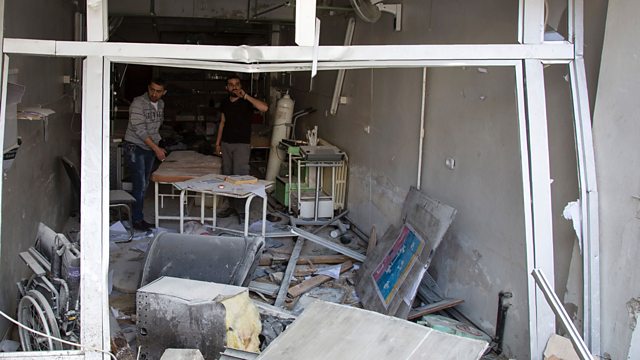The ‚ÄėWeaponisation‚Äô of Healthcare in Syria
The weaponisation of health in Syria; South Africa’s crystal meth babies; Phantom limb pain
This week is the sixth anniversary of the start of the Syrian conflict. To mark this, a new study has been published in the journal The Lancet, highlighting the impact of the war on health care in the country. It concludes that healthcare in Syria is being used as a weapon of war on an unprecedented scale. Based in Beirut, one of the report’s authors Samer Jabbour explains to Claudia how hundreds of health workers have been killed or tortured and hospitals deliberately attacked - despite this being in violation of international human rights laws.
Karen Schoonbee reports from Cape Town on the growing problem of women using crystal meth ‚Äď known locally as tik ‚Äď during their pregnancies. We hear from a doctor about the developmental delays experienced by these ‚Äútik babies‚ÄĚ. One teacher has nearly a third of the children in her class affected by the drug and she fears that they will drop out of school because of a lack of support.
‚ÄúPhantom limb pain‚ÄĚ is experienced by up to 80% of people who have a limb amputated ‚Äď and the pain is often resistant to medication. The discomfort occurs despite the limb no longer being present ‚Äď a phenomenon which has puzzled researchers for years. Now a team from Sweden is trialling a new approach ‚Äď harnessing the power of virtual reality to restore normal function in the circuits of the brain.
Photo: Getty Images
Last on
Broadcasts
- Wed 15 Mar 2017 19:32GMT91»»Ī¨ World Service East and Southern Africa & West and Central Africa only
- Wed 15 Mar 2017 20:32GMT91»»Ī¨ World Service Online, Americas and the Caribbean, Australasia, Europe and the Middle East & UK DAB/Freeview only
- Wed 15 Mar 2017 21:32GMT91»»Ī¨ World Service East Asia & South Asia only
- Thu 16 Mar 2017 02:32GMT91»»Ī¨ World Service Americas and the Caribbean
- Thu 16 Mar 2017 03:32GMT91»»Ī¨ World Service Online, Europe and the Middle East & UK DAB/Freeview only
- Thu 16 Mar 2017 04:32GMT91»»Ī¨ World Service East Asia & South Asia only
- Thu 16 Mar 2017 05:32GMT91»»Ī¨ World Service Australasia
- Thu 16 Mar 2017 07:32GMT91»»Ī¨ World Service East and Southern Africa & Europe and the Middle East only
Podcast
-
![]()
Health Check
Health issues and medical breakthroughs from around the world.


